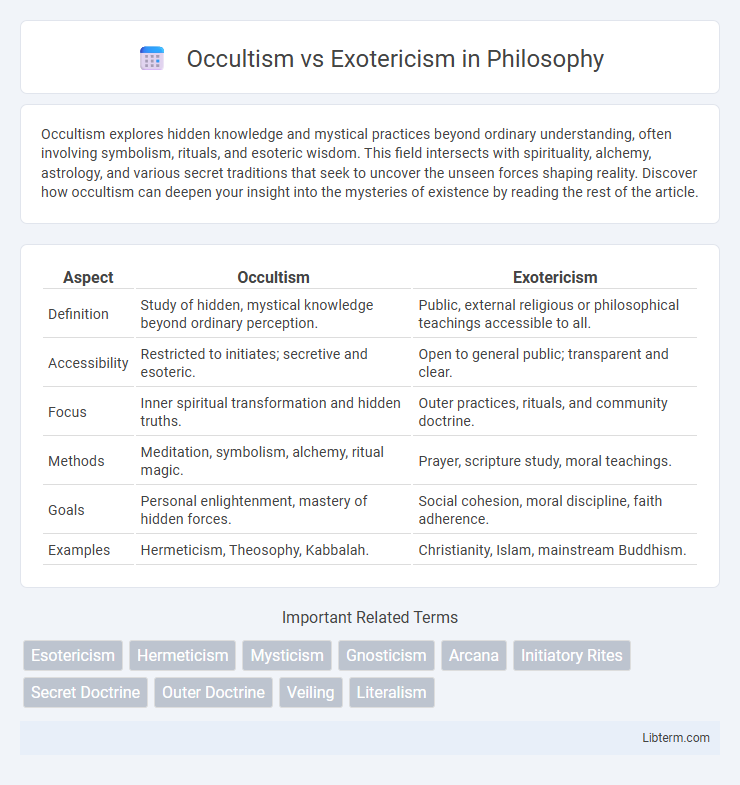Occultism explores hidden knowledge and mystical practices beyond ordinary understanding, often involving symbolism, rituals, and esoteric wisdom. This field intersects with spirituality, alchemy, astrology, and various secret traditions that seek to uncover the unseen forces shaping reality. Discover how occultism can deepen your insight into the mysteries of existence by reading the rest of the article.
Table of Comparison
| Aspect | Occultism | Exotericism |
|---|---|---|
| Definition | Study of hidden, mystical knowledge beyond ordinary perception. | Public, external religious or philosophical teachings accessible to all. |
| Accessibility | Restricted to initiates; secretive and esoteric. | Open to general public; transparent and clear. |
| Focus | Inner spiritual transformation and hidden truths. | Outer practices, rituals, and community doctrine. |
| Methods | Meditation, symbolism, alchemy, ritual magic. | Prayer, scripture study, moral teachings. |
| Goals | Personal enlightenment, mastery of hidden forces. | Social cohesion, moral discipline, faith adherence. |
| Examples | Hermeticism, Theosophy, Kabbalah. | Christianity, Islam, mainstream Buddhism. |
Defining Occultism: Hidden Wisdom and Esoteric Teachings
Occultism centers on hidden wisdom and esoteric teachings that explore the metaphysical and supernatural realms beyond ordinary perception. It involves practices such as mysticism, alchemy, and magic aimed at uncovering secret knowledge inaccessible to the general public. Unlike exotericism, which emphasizes external rituals and public doctrine, occultism delves deeply into inner spiritual truths and concealed cosmic principles.
Unpacking Exotericism: Public Doctrines and Outer Practices
Exotericism involves public doctrines and outer practices accessible to a broad audience, emphasizing shared rituals and teachings within religious or spiritual communities. It contrasts with occultism, which delves into hidden knowledge and inner mysteries reserved for initiates. Exoteric traditions prioritize clear, communal expressions of belief, often codified in sacred texts and formal ceremonies.
Historical Roots: Origins of Occult and Exoteric Traditions
Occultism traces its origins to ancient mystical practices found in Hermeticism, alchemy, and Gnosticism, emphasizing hidden knowledge and spiritual transformation accessible only to initiates. Exotericism, by contrast, is rooted in the public religious rituals and doctrines of major world religions such as Judaism, Christianity, and Islam, aiming to provide universal teachings for the general population. The divergence between occult and exoteric traditions reflects historical developments where esoteric knowledge was preserved by secret societies while exoteric beliefs formed the foundation of institutionalized religion.
Core Principles: Mystical vs. Mainstream Approaches
Occultism centers on hidden knowledge and esoteric traditions, emphasizing mystical experiences and personal spiritual transformation that lie beyond ordinary perception. Exotericism promotes accessible teachings grounded in mainstream religious or philosophical frameworks, prioritizing communal rituals and widely accepted doctrines. The core distinction reflects occultism's inward, secretive quest for deeper truths versus exotericism's outward, public adherence to established belief systems.
Symbolism and Secrecy: Tools of Occult Knowledge
Symbolism in occultism serves as a powerful tool to encode hidden meanings accessible only to initiates, contrasting with exotericism's straightforward use of symbols for public understanding. Secrecy maintains the mystique and protection of esoteric knowledge in occult traditions, ensuring that sacred truths remain concealed from unprepared individuals. This dual use of symbolism and secrecy distinguishes occult teachings as exclusive, inner paths compared to the openly shared doctrines of exoteric beliefs.
Accessibility of Teachings: Elite Initiation vs. Mass Instruction
Occultism emphasizes elite initiation, restricting knowledge to select individuals through secret rites and symbolic language, preserving the mystery and profundity of esoteric wisdom. In contrast, exotericism promotes mass instruction by openly sharing teachings through written texts, public lectures, and accessible practices designed for broad comprehension. This fundamental difference in accessibility defines occultism as an exclusive path for initiated adepts, while exotericism serves as an inclusive framework for general spiritual education.
Practical Applications: Rituals, Ethics, and Social Roles
Occultism emphasizes hidden knowledge accessed through rituals that promote personal transformation, often involving symbolism, meditation, and ceremonial magic to influence spiritual and material realities. Exotericism centers on openly shared practices with ethical frameworks aimed at community cohesion, teaching moral conduct and social responsibilities through conventional religious ceremonies and public rituals. Both frameworks define distinct social roles; occult practitioners act as initiates or adepts guiding spiritual exploration, while exoteric leaders serve as educators and moral exemplars within communal traditions.
Influence on Religion and Society: Occultism and Exotericism Today
Occultism and exotericism influence contemporary religion and society by shaping spiritual practices and belief systems. Occultism, with its emphasis on hidden knowledge and esoteric rituals, appeals to individuals seeking personal transformation and alternative spirituality. Exotericism, centered on public religious teachings and communal rites, reinforces established social norms and broad religious identity in mainstream culture.
Common Misconceptions and Modern Interpretations
Occultism is often misunderstood as secretive or forbidden knowledge reserved for a select few, while exotericism represents openly accessible spiritual teachings aimed at the general public. Modern interpretations emphasize that occultism explores hidden dimensions of reality through esoteric practices like alchemy, astrology, and mysticism, contrasting with exotericism's focus on ethical teachings and communal rituals. Common misconceptions conflate occultism with superstition or dark magic, neglecting its historical role in shaping scientific inquiry and philosophical thought.
Bridging the Divide: Synthesis in Contemporary Spiritual Movements
Contemporary spiritual movements often synthesize occultism and exotericism by integrating esoteric knowledge with accessible public teachings, fostering holistic spiritual experiences that bridge hidden wisdom and communal practice. This fusion promotes a balanced approach, where occult practices enrich mainstream rituals and symbolic frameworks, enhancing personal transformation and collective spirituality. By blending secretive mystical traditions with widely shared belief systems, these movements create inclusive pathways that accommodate diverse seekers and deepen engagement with metaphysical insights.
Occultism Infographic

 libterm.com
libterm.com